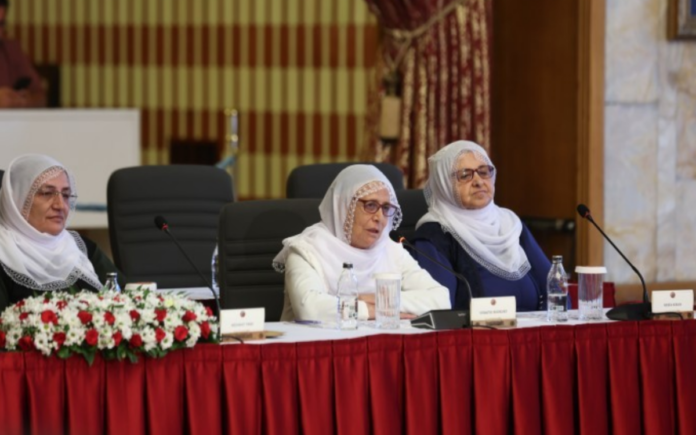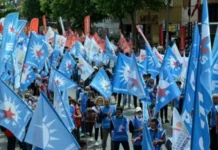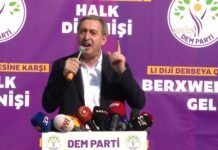A human rights group and Kurdish politicians have condemned the Turkish Parliament after a “Peace Mother” was warned not to speak Kurdish when addressing a commission meeting, saying the move undermines efforts to resolve Turkey’s decades-long conflict through dialogue, Turkish Minute reported.
The incident took place on Wednesday at the fifth meeting of the parliament’s Commission on National Solidarity, Brotherhood and Democracy, which was set up last month to hear from civil society groups and individuals as part of a new government initiative that led to the the outlawed Kurdistan Workers’ Party’s (PKK) decision in May to lay down arms after a call from its imprisoned leader Abdullah Öcalan.
The PKK, designated as a terrorist organization by Turkey and its Western allies, waged a four-decade insurgency that left more than 40,000 people dead.
Among those invited were members of the Saturday Mothers, who have long sought justice for relatives who disappeared in police custody, and the Peace Mothers, Kurdish women whose children died in the conflict or joined the PKK.
When Peace Mothers representatives Nezahat Teke and Rebia Kıran asked to address the commission in Kurdish, parliament speaker Numan Kurtulmuş rejected the request, citing assembly rules requiring the use of Turkish. Kıran began her remarks in Kurdish regardless but was warned and switched to Turkish.
The move triggered immediate criticism. Former lawmaker Sırrı Sakık of the pro-Kurdish Peoples’ Equality and Democracy Party (DEM Party) said on social media: “A Peace Mother is warned and interrupted for speaking Kurdish. How can those who cannot tolerate her language build peace? Peace in this country starts when a Kurdish mother’s voice, language and pain are respected.”
The Human Rights Association (İHD), one of Turkey’s oldest rights groups, said blocking the women from speaking in their mother tongue “runs completely counter to the essence of the peace process.” The group called on parliament to apologize to the Peace Mothers and all citizens whose first language is Kurdish, arguing that the decision violates both Turkey’s constitution and international conventions guaranteeing freedom of expression.
Other Kurdish figures also voiced anger. Sebahat Tuncel, a women’s rights activist and former lawmaker, wrote: “The Peace Mothers’ request to speak in their mother tongue in parliament is legitimate. Without reconciliation with Kurdish, can there be peace?”
DEM Party spokeswoman Ayşegül Doğan said the commission should have “shown maturity” and allowed the mothers to speak in Kurdish, adding that “the opportunity could have been provided.”
The Peace Mothers themselves emphasized that reconciliation requires more than symbolic gestures. Teke described losing her 19-year-old daughter, who set herself on fire in protest of the 1999 imprisonment of PKK leader Abdullah Öcalan. “For 25 years, the smell of her burning hair has been with me. I cried; other mothers should not cry,” she told the commission, urging that “we bury weapons, not our children.” Kıran said that if returning PKK members are only faced with life sentences, “how can we persuade others to burn their weapons? They should be able to enter politics instead.”
Kurds in Turkey are often pressured not to speak their native language. Authorities frequently claim that people speaking in Kurdish are chanting slogans in support of the PKK.
Prohibitions against the use of Kurdish in Turkey go back many years. Kurdish language, clothing, folklore and names were banned in 1937. The words “Kurds,” “Kurdistan” and “Kurdish” were among those officially prohibited. After a military coup in 1980, speaking Kurdish was formally forbidden, even in private life.
Although the visibility of Kurdish on TV and in the print media was only made possible in the early 2000s thanks to significant progress made in the country’s bid to become a member of the EU, its public use in state institutions remains restricted.















